IMO's Facilitation Committee Revised MASS Roadmap
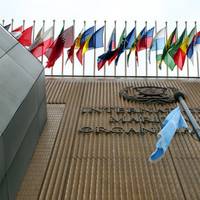
The IMO's Facilitation Committee held its 48th session (FAL 48) from April 8 to 12, in person at IMO Headquarters in London.The Facilitation Committee (FAL) meets annually to deal with matters related to the facilitation of international maritime traffic, including the arrival, stay and departure of ships, persons and cargo from ports. The Committee also addresses electronic business and aims to ensure that the right balance is struck between regulation and the facilitation of international maritime trade.
IMO Facilitation Committee to Discuss Autonomous Shipping
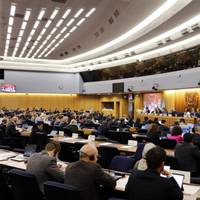
The IMO Facilitation Committee will meet in person at IMO Headquarters in London for its 48th session (FAL 48) from April 8 to 12 to discuss issues related to autonomous shipping; prevention of illegal wildlife trafficking on ships; digitalization initiatives and the implementation of the Maritime Single Window and Port Community Systems.The Facilitation Committee (FAL) will continue discussions around regulating commercial vessels that can operate independent of human interaction - Maritime Autonomous Surface Ships (MASS).
Ten Organizations Team Up on Guidelines for Combating Illegal Wildlife Trafficking

Ten organizations have joined forces to combat illegal wildlife trafficking through increasing awareness and vigilance across global supply chains.Together, they have produced practical guidelines for all supply chain participants, with advice on measures to take, questions to ask to help identify criminal wildlife trade, and guidance on reporting suspicious activities. An accompanying "Red Flags" document serves as a daily reference for all individuals involved in the supply chain.
Norwegian Parliament Strikes Deal to Advance Seabed Mining
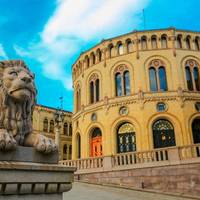
Norway's minority government and two opposition parties have agreed to allow seabed mineral exploration in the Arctic region, they said on Tuesday, in a key step towards full-scale ocean mining.The deal comes as Norway hopes to become the first country to make deep-sea mining happen on a commercial scale and secure critical minerals and jobs despite concerns over the environmental impact and international calls for a moratorium.The amended version of the government's proposal, which parliament will formally debate on Jan.
Wanted: A Sea-change in Climate Finance for Oceans
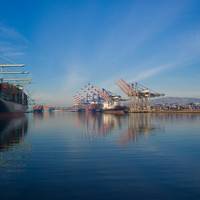
The oceans are inextricably connected to the health of the planet, and of humans: they absorb up to 30% of annual greenhouse gas (GHG) emissions and 90% of excess heat, and over 3 billion people — almost half the global population — depend directly on marine and coastal biodiversity for their livelihoods.Healthy coastal ecosystems are also critical to the world’s ability to withstand the impact of climate change. Not only do mangrove forests, for example, hold four times the amount of carbon per hectare as tropical forests…
European Group Lifts Funding to $4.6B to Prevent Plastic Pollution in Seas
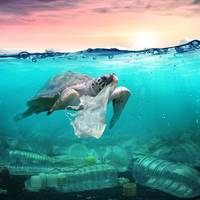
A group of European development banks plan to double its funding for global efforts to stop plastic waste from polluting the world's oceans to 4 billion euros ($4.6 billion).The Clean Oceans Initiative, led by the French and German development banks and the European Investment Bank is the largest such grouping targeting plastic pollution of the sea.Around 8 million tonnes of plastic waste enters the oceans every year, most of it discarded on land or washed into rivers, the group said on Friday…
Subsea Mining: All Eyes on Marine Minerals Offshore Norway
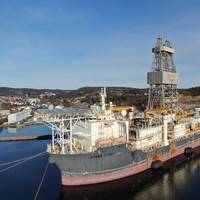
Marine minerals are coming under sharp focus offshore Norway. Analysts suggest it could be a $20 billion annual revenue industry by 2050, which is why many are taking an interest and developing the technology to make it happen. Marine mineral mining has been something of a slow burner in the wider marine world. It has some clear challenges, not least location and depth of these potential resources, but also concerns around its environmental impact.Yet it now appears to be coming into a distinctly sharp focus…
Governments Join Damen's Fight Against Invasive Species in Ballast Water
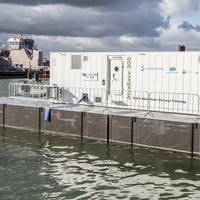
Climate Investor Two has approved an investment that could amount to €24.5 million ($29.4 million) to support the lease of Damen’s portable ballast water treatment solution InvaSave to customers in Africa, Asia and Latin America.Climate Investor Two (CI2) is a financing facility mandated to invest in water, sanitation and ocean infrastructure projects in emerging economies. It enjoys cornerstone support from the EU and the Dutch Fund for Climate and Development (DFCD). The consortium that manages the 160 million DFCD also includes World Wide Fund for Nature Netherlands (WWF-NL)…
Divers Find Nazi Enigma Device while Searching for Fishing Nets in Baltic Sea

German divers searching the Baltic Sea for discarded fishing nets have stumbled upon a rare Enigma cipher machine used by the Nazi military during World War Two which they believe was thrown overboard from a scuttled submarine.Thinking they had discovered a typewriter entangled in a net on the seabed of Gelting Bay, underwater archaeologist Florian Huber quickly realized the historical significance of the find.“I’ve made many exciting and strange discoveries in the past 20 years.
Rare Dolphins Return to Hong Kong as Coronavirus Halts Ferry Traffic
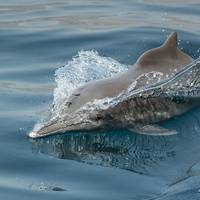
The number of Indo-Pacific humpback dolphins seen around Hong Kong has jumped as the pause in high-speed ferry traffic due to the coronavirus allows the threatened species to make something of a comeback, scientists said.Marine scientist Lindsay Porter of the University of St. Andrews said the mammals - also known as Chinese white dolphins and pink dolphins - were moving back into parts of the Pearl River Delta that they typically avoided due to the ferries that connect Hong Kong and Macau.Dolphin numbers in the area had jumped by up to 30% since March when the ferry traffic was suspended…
Cruise Ships Dump 90% of Grey Water in BC
1.54 billion liters of grey water were generated by ships off the British Columbia coast in 2017 - the equivalent of more than 600 Olympic-size swimming pools, said a study.World Wildlife Fund Canada says cruise ships traveling between Washington state and Alaska are responsible for dumping "the vast majority" of the potentially toxic grey water that ends up off the B.C. coast each year.Cruise ships accounted for 1.37 billion (almost 90%) of the 1.54 billion liters of grey water generated off the B.C. coast in 2017, the study revealed.Grey water — the drainage from dishwater, galley sinks, and showers — may contain contaminants ranging from grease, oil and flame retardants to disinfectants, fecal coliform and micro-plastics, among other substances.
Canada to Save Rapidly-Melting Arctic Ice
Canada’s Arctic warming at three times the global rate, permafrost melting 70 years ahead of predictions, the worst polar wildfire season on record.To counter bad news on northern climate-change, plans have now moved forward to protect Tuvaijuittuq. Meaning “the ice never melts” in Inuktitut, it’s a globally important area in the Canadian High Arctic almost the size of Germany.The Qikiqtani Inuit Association, working with the governments of Canada and Nunavut, has led the charge to make Tuvaijuittuq a 322,000 sq. km interim Marine Protected Area with an impact benefit agreement that delivers on their promise of a conservation economy…
NGOs Furious on Lack of Arctic Action
The Clean Arctic Alliance expressed frustration over Members States’ failure to address the risk to the Arctic from emissions of black carbon from international shipping, after a meeting of the International Maritime Organization’s Marine Environment Protection Committee (MEPC 74) closed in London.A proposal by the Clean Shipping Coalition and Clean Arctic Alliance member Pacific Environment to immediately switch away from heavy fuel oil – a major source of shipping’s black carbon emissions – to distillate fuels did not garner adequate support from Member States.There was however, broad support among Member States for regulations to control black carbon emissions…
Ørsted Lauches Offshore Wind Biodiversity Policy
The largest energy company in Denmark, Ørsted A/S announced ‘Offshore wind biodiversity policy’ to set out the principles that underpin our efforts to protect the natural environment in the areas where we develop, construct and operate offshore wind farms.“Renewable energy plays a major role in mitigating climate change and the threat it poses to biodiversity. At the same time, it is important to protect biodiversity at our wind farm projects and sites,” said Hans Lyhne Borg, Head of Environment, Consents & Property at Ørsted.“Our biodiversity policy formalizes and makes it transparent that Ørsted takes responsibility for the natural environment…
Clean Arctic Alliance Calls for Renewing Commitment to HFO Ban
Clean Arctic Alliance called on member states to “renew their commitment” so that a ban on the use and carriage of polluting heavy fuel oil (HFO) from Arctic shipping can be adopted in 2021 as the International Maritime Organization (IMO’s Marine Environment Protection Committee (MEPC 73) gathered yesterday (October 22) in London.“IMO member states must be resolute in ensuring that the Arctic ban on heavy fuel oil is developed by 2020, and adopted in 2021, to protect Arctic ecosystems and communities from both the threat of oil spills and the impact of black carbon emissions”, said Dr Sian Prior, lead advisor to the Clean Arctic Alliance…
Clean Arctic Alliance Welcomes Russian-Finnish Deal on Green Fuel
The Clean Arctic Alliance welcomes the joint statement by Russian President Vladimir Putin and Finnish President Sauli Niinisto on the need to move to cleaner ships’ fuels such as LNG in the Arctic.Speaking on behalf of the Clean Arctic Alliance, Alexey Knizhnikov of WWF Russia said that “the risks of using heavy fuel oil in the Arctic are too high, and we welcome President Putin and President Niinisto’s vision and leadership in seeking to move to cleaner fuels for Arctic shipping. We should now expect that the Russian Federation’s position on the HFO issue will be adjusted in line with President Putin’s statement, and we hope to see…
Oldendorff Joins Sustainable Shipping Initiative
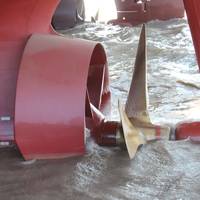
Dry bulk ship owner and operator Oldendorff Carriers has become a member of the Sustainable Shipping Initiative (SSI), a coalition of global shipping industry companies working toward a more environmentally sustainable maritime industry.Oldendorff joins other SSI members, including ABN-Amro, AkzoNobel, Bunge, China Navigation, IMC Shipping, Lloyd’s Register, Louis Dreyfus, Maersk, Priya Blue, Rightship and Wartsila, who are working together with NGOs Forum for the Future and WWF…
New WWF Guide Helps Mariners Steer Clear of Arctic Wildlife
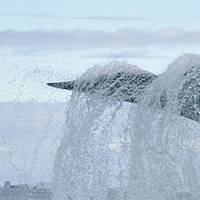
A new WWF-Canada guide designed to help mariners in the eastern Arctic identify and avoid marine mammals is being unveiled at a Canadian Marine Advisory Council meeting in Montreal today. With summer sea ice on the decline and industrial pressures increasing, shipping traffic in the Canadian Arctic has steadily risen. This is especially true in the eastern Arctic and around the community of Pond Inlet and the Mary River iron ore mine. Ships servicing the Baffinland mining operation are increasing at a staggering pace…
Ban Heavy Fuel Oil in the Arctic: WWF-Canada
International Maritime Organization (IMO) has agreed to take steps that could lead to a phase-out of the use of heavy fuel oil (HFO) in Arctic shipping following an appeal from the Government of Canada, Indigenous participants and testimony from WWF-Canada. During a week-long meeting at IMO headquarters in London, WWF highlighted recent reports outlining major gaps in spill response capacity in the Arctic. The Canadian delegation’s submission on how to reduce the impacts of HFO in the Arctic received wide support from all Arctic states (United States, Russia, Finland, Norway, Iceland, Sweden, and Denmark/Greenland) as well as several non-Arctic states. This is likely the first step towards phasing out the use of HFO in the Arctic entirely.
Canada Orders Ships to Reduce Speed to Prevent Whale Deaths
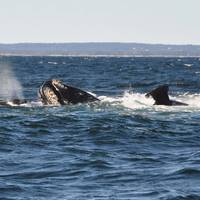
Certain ships are being ordered to reduce speed because of the deaths of at least 10 North Atlantic right whales in Canada's Gulf of St Lawrence during the past two months, the government said on Friday. The deaths have made 2017 the deadliest year for the endangered marine mammal since scientists began tracking their numbers in the 1980s, researchers said. The ministries of transport and fisheries issued a temporary order for vessels 20 meters or longer to slow to a maximum of 10 knots in the western portion of the Gulf, which stretches from Quebec to north of Prince Edward Island.
IMO Promotes Fishing Vessel Safety
When it comes to fishing vessel safety, the mission is clear, says Sandra Allnutt of the International Maritime Organization (IMO): enhance safety to save lives. “We want to reduce loss of life in one of the most dangerous professions in the world, and we want to enhance safety on board fishing vessels,” said Ms Allnutt, Head of Maritime Technology in IMO’s Maritime Safety Division, following a regional seminar, in Cape Town, South Africa, to promote ratification and implementation of a key fishing vessel safety treaty known as the Cape Town Agreement of 2012. “This Agreement, once fully ratified, in force and implemented, will be an internationally binding agreement which will facilitate better control of fishing vessel safety by flag, port and coastal States.
Call for Carriage Ban on Non-Compliant Fuel
A group of leading environmental and maritime shipping organizations have called for the prohibition of transporting non-compliant marine fuels once the global 0.5 percent sulfur cap takes effect in 2020. The United Nation's International Maritime Organization (IMO) has agreed that from 1st January 2020 the maximum permitted sulphur content of marine fuel (outside Emission Control Areas) will reduce from 3.5% to 0.5%. Unless a ship is using an approved equivalent compliance method, there should be no reason for it to be carrying non-compliant fuels for combustion on board. The 2020 sulphur cap will provide substantial environmental and human health benefits as a result of the reduced sulphur content of marine fuels used from 1 Jan 2020.
Fast, Quick Action Needed to Meet Paris Climate Goals: CAN
The International Maritime Organisation (IMO) has agreed on an initial strategy to decarbonise international shipping and reduce emissions from ships by at least 50% by 2050. While this agreement falls short of the 70 to 100% reductions by 2050 that the Pacific Islands, the EU and others were calling for ahead of the meeting, it keeps a window open to meet the Paris climate goals and is undeniably a game changer for the shipping sector. This plan serves as a welcome first step to phase out emissions from the sector, but the IMO must now build on the agreed minimum target of 50% reductions in subsequent reviews of the strategy to comply with its fair share of emissions under the Paris Agreement.





